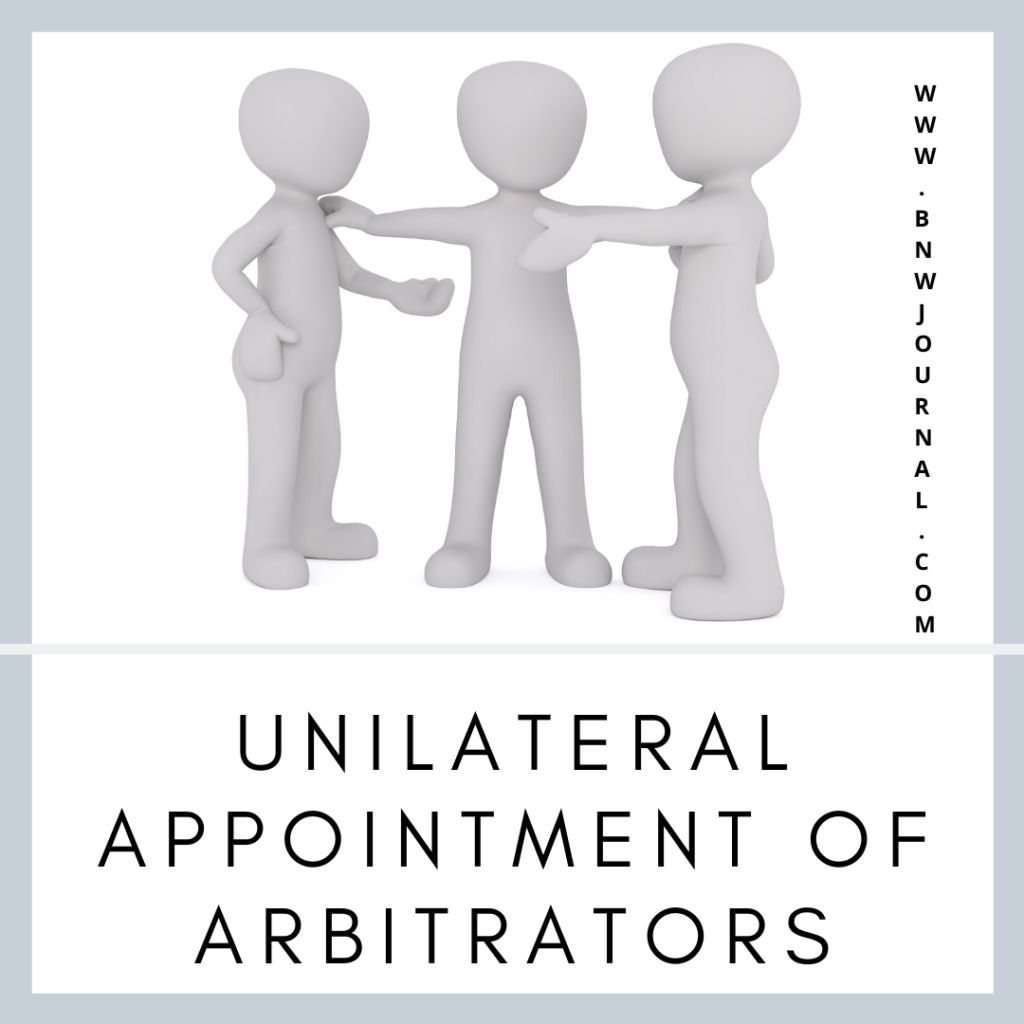![]()
Introduction
In a short period, there is a heat of debate and a long chain of litigation. It took place and still ongoing, on the validity of clauses. Specally which provide right to a single party for the unilateral appointment of Arbitrators. There are a variety of these clauses which are giving the sole right to one party to appoint an arbitrator or panel of them. Not giving the other party an equal opportunity for the same. These situations can mostly be seen in the agreements with Government/s or public sectors. They appoint arbitrators from their ranks, creating an inherent biasness in the arbitration process.

The Arbitration and Conciliation (Amendment) Act, 2015 laid down provisions to prevent such bias by introducing Section 12(5)(1) and the 7th schedule to the Arbitration and Conciliation Act, 1996. It prohibit some categories of people to act as an arbitrator. It can be disqualifies the person to be an arbitrator.
SC’s view
TRF Limited v. Energo Engineering Projects Limited
In TRF Limited v. Energo Engineering Projects Limited[1], Supreme Court held that a person who is barred from being an arbitrator under Section 12(5) read with the Seventh Schedule of the Act, will also be barred from nominating an arbitrator. The court further state that it will be unfair to give power to the person who himself is disqualify from being an arbitrator. And doing so will put reasonable doubts in the mind of the parties. Court quotes a phrase that ‘once the infrastructure collapses, the superstructure is bound to collapse as well’. In the case, the Managing Director(MD) was disqualified from becoming an arbitrator. The Court says once the MD gets ineligible to be arbitrator, he will not possess the right to appoint an arbitrator.
Perkins Eastman Architects DPC & Anr. V HSCC (India) Ltd
The same statement of the Supreme Court in another case of Perkins Eastman Architects DPC & Anr. V HSCC (India) Ltd[2], in which the Court observed that the disqualification of the Managing Director in TRF Limited case was due to his interest in the outcome of the dispute. This point was as the possibility of bias by the court. Further, that giving the sole right to one party will also give them the invisible power. It is to influence the conclusion which will arise out of the dispute. Therefore, the Amendment Act and the Judgment give in the former case will not prevent from having an interest in the outcome of the dispute.
Central Organisation for Railway Electrification v M/S EVI-SPIC-SMO-MCML (JV)
But keeping aside all the judgements, Supreme Court in Central Organisation for Railway Electrification v M/S EVI-SPIC-SMO-MCML (JV)[3], held an arbitration clause valid. It gives power to one party to nominate a panel of four arbitrators of the same company. From which the opposite party will select their two nominees. The GM of former than select one of them as the opposite party nominee. And the third and final arbitrator will also be appoint on the panel.
It seems like the Supreme Court incorrectly interpret the saying in TRF case. By giving the power to the ineligible person to nominate an arbitrator in Railway Electrification Case.
Taking account in all the cases, now we will see which appoints have been upheld and which precedents created ambiguities.
Appointments
I. Ineligible Arbitrator or appointment of Nominee
This arbitration clause says that an ineligible individual can be appointed as arbitrator. If fails to be an arbitrator, then he has the right to appoint another person as an arbitrator.
In TRF Limited case it was said that the nominee appointed by MD, has to act as an arbitrator. In Bharat Broadband Network Ltd. v United Telecoms Ltd[4], it was stated that the Chairman and Managing Director(CMD) of one of the company has to act as a sole arbitrator and if they are not willing to be one, then the person so-called or appointed by the CMD must act as an arbitrator.
By the Seventh Schedule of the Act, the Managing Director is disqualified to be an arbitrator.
In Bharat Broadband case SC rely on previous judgements and stat that; when the appointing party is a State Authority. Than they should pay more attention in appointing an independent and unbiase arbitrator.
II. Ineligible Arbitrator’s Nominee
This clause states the power of an ineligible arbitrator to appoint a sole arbitrator. He will decide the dispute between the parties.
This clause was given in Perkins Eastman case where it was says that the person appoint by CMD will be the only arbitrator and no other person can become an arbitrator.
The court made a difference in the cases deal earlier and in the present case, where it is that a Managing Director will not himself will arbitrate the matter, but, may appoint a person who will deal with the case and act as an arbitrator. Supreme Court held and applied in the ineligibility criteria in both the cases that the disqualified member will neither act as an arbitrator nor will appoint one.
III. Panel of Arbitrators
This clause has its roots in the Voestalpine case. First, take a look at the case.
In Voestalpine Schinen Gmbh v Delhi Metro Rail Corporation Ltd[5], the clause said that there should be a panel of three-person to adjudicate the case. DMRC has to nominate five people who are serving or are retire engineers of DMRC. And same has to be give to the petitioner. Both the parties have to select one arbitrator each for themselves and they have to become the third and final arbitrators. However, the corporation provide the petitioner with a list of 31 people who are not the part of DMRC but are the retire persons of other government offices and railways.
Supreme Court in its judgement struck down the root of the clause in the agreement and state that having a limit choice in the list will favour DMRC and it shows an indirect interest of them in the result of the dispute.
However, SC upheld the list having 31 people as it provides a wide range of option to the opposite party to choose their arbitrator from it. It neither include the names of employees or ex-employees of the DMRC nor it proscribe the government/ex-government officials to take part as an arbitrator. Further, the Court direct that the list should include the names of the engineers, accountants, lawyers or judges to be appoint as arbitrators.
Keeping in mind, the verdict of SC in the said case, Court decided the matter of Railway Electrification case. However, they have misinterpret several points while making the judgements setting aside the other cases divert from what is propose in the former judgements.[6]
Conclusion
the clause said that there should be a panel of three-person to adjudicate the case. DMRC has to nominate five people who are serving or are retire engineers of DMRC. And same has to be give to the petitioner. Both the parties have to select one arbitrator each for themselves and they have to become the third and final arbitrators. However, the corporation provides the petitioner with a list of 31 people who are not the part of DMRC but are the retire persons of other government offices and railways.
Going by the aforementioned cases, we can surely say that the appointment process has been derailed by enormous judgements passed by the Court of Law. These issues are again pending in the Supreme Court in the case Bhayana Builders Pvt. Ltd. v Oriental Structural Engineers Pvt. Ltd.[7].
It is being hope that the Supreme Court will give a proper direction in regard to this and it will come to an end.
References:
[1](2017) 8 SCC 377.
[2](2019) SC 1517.
[3]Civil Appeal No. 9486-9487 of 2019 arising out of SLP (C) No. 24173-74 of 2019.
[4]Civil Appeal Nos. 3972 of 2019 arising out of SLP (C) No. 1550 of 2018.
[5]Arbitration Petition (C) No. 50 of 2016.
[6]NPAC’s Arbitration Review: Validity of Unilateral Appointment of Arbitrators: Indian Courts blow Hot and Cold, available at: https://www.barandbench.com/columns/validity-of-unilateral-appointment-of-arbitrators-indian-courts-blow-hot-and-cold (Modified on May 4, 2020).
[7]SLP (C) No. 007161 of 2018.



0 Comments